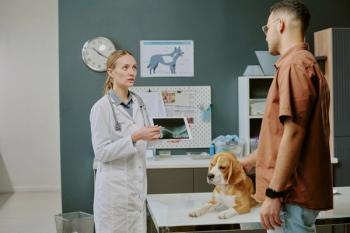
Evaluating a probiotic for clinical use (Sponsored by Iams)
Not all probiotics are created equal, as the range and depth of probiotic benefits correlate to the species and strain of the probiotic used. Even different strains of the same species have been noted to vary in a number of ways, including stability, ability to colonize the gastrointestinal tract, expression of enzymes, and the production of inhibitory substances. Fortunately, there are characteristics of effective probiotics to look for when evaluating a probiotic for clinical use. These characteristics are outlined in this article.
Probiotics are live bacterial preparations, such as dietary supplements or food, which contain beneficial microorganisms, similar to those found naturally in people and pets. While the health benefits of probiotics have been well documented in people, specifically in improving gastrointestinal health and helping to enhance immunity, recent studies have only begun to explore and demonstrate the potential health benefits of probiotics for pets. From those studies conducted, however, some of the benefits of veterinary probiotic use can be seen.
Electron micrograph of canine-derived BifidoÂbacteriumÂanimalis.
The mechanisms by which probiotics benefit their host—in both people and pets—are not completely understood, but they may involve:
- Enhancement of enteric and systemic immune systems
- Systemic anti-inflammatory action
- Intestinal pH modification
- Suppression of pathogenic bacteria through the production of inhibitory substances
- Competition with pathogens for nutrients and mucosal attachment sites.
Of course, not all probiotics are created equal, as the range and depth of probiotic benefits correlate to the species and strain of the probiotic used. Even different strains of the same species have been noted to vary in a number of ways, including stability, ability to colonize the gastrointestinal tract, expression of enzymes, and the production of inhibitory substances. Fortunately, there are characteristics of effective probiotics to look for when evaluating a probiotic for clinical use. These characteristics are outlined below.
Survivability and transient colonization
An effective probiotic first needs to withstand commercial processing and storage to survive transit from the manufacturing site to the host's possession. Therefore, probiotics that can be stored on the shelf have an advantage over those that require refrigeration, as a low-moisture environment helps to preserve viable molecules. Avoidance of air also aids in the preservation of viable microbes.
Once ingested by the host, the probiotic needs to survive passage through the highly acidic environment of the stomach and resist digestion by bile to reach, in adequate numbers, the host's intestinal tract. Then, in order to be successful, the probiotic must adhere to the appropriate sites of the gastrointestinal tract long enough to temporarily colonize.
Did you know?
Probiotics that are native to the target species may be better adapted to adhere and possibly colonize the gastrointestinal tract. Adherence and colonization allow greater concentration of the probiotic to help maintain intestinal barrier function and compete with pathogens for sites.
Anti-pathogenic and immune-enhancing effects
Effective probiotics limit the colonization of undesirable bacteria in several ways. Probiotics can limit harmful bacteria in the gastrointestinal tract by occupying necessary attachment sites and absorbing essential nutrients. Probiotics can also produce inhibitory substances such as organic acids (lactic, acetic, butyric), to regulate undesirable bacteria. The inhibition of the production or action of bacterial toxins has also been demonstrated by probiotics.1
Client education
Besides producing anti-pathogenic substances, some probiotics can produce immune-enhancing substances. Among the numerous groups of beneficial bacteria, there are those that can effectively utilize fermentable dietary fibers, such as fructooligosaccharides and beet pulp. Bacterial fermentation of these fibers produces short-chain fatty acids and lactate, which are the preferential fuel for enterocytes, which line the intestine. Health benefits associated with higher densities of probiotics capable of producing these substances include enhancement of enteric and systemic immune systems, management of gastrointestinal disease, increased absorption of minerals, and improved stool characteristics.2
It is through the combination of these characteristics that the full range of probiotic benefits to the gastrointestinal tract is achieved. However, it is now recognized that the effects of probiotics may extend well beyond the gastrointestinal tract. Many of these extra-gastrointestinal effects appear to be related to changes in the immune system from probiotic use. Supplementation with probiotics has the potential to provide benefit to pets with a range of conditions, and research will only continue to further define the optimal uses of probiotics in pets.
References
1. Strompfova V, Marcinakova M, Simonova M, et al. Application of potential probiotic Lactobacillus fermentim AD1 strain in healthy dogs. Anaerobe 2006;12:75-79.
2. Buddington RK, Buddington KK, Sunvold GD. The use of fermentable fibers to manage the gastrointestinal tract. In: Reinhart G, Carey D, eds. Advances in canine and feline nutrition. Orange Frazer Press, 2000;169-179.
Newsletter
From exam room tips to practice management insights, get trusted veterinary news delivered straight to your inbox—subscribe to dvm360.




